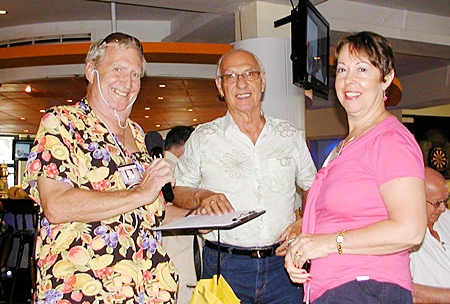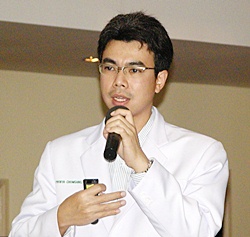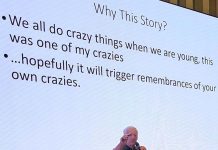Master of Ceremonies Roger Fox welcomed everyone to the regular Sunday meeting of the Pattaya City Expats Club on February 20, at Amari Resort’s Tavern by the Sea. After the usual opening announcements, he introduced Dr. Prinya Chomsang, M.D. as guest speaker. Dr. Prinya is a cardiologist with Bangkok Hospital Pattaya’s Heart Center.
With Valentine’s Day just over, Dr. Prinya pointed out that besides being struck by Cupid’s arrow, there are other things that can go wrong with your heart. First, the heart is a muscle and acts as a pump. Its job is to ensure that blood flows through the body. Blood carries all the vital materials which help our bodies function and removes the waste products that we do not need. With the aid of diagrams, Dr. Prinya described the various components of the heart, starting with the arteries, then the chambers and valves, as well as other integral parts. Also, surrounding the heart is the pericardium, which is two layers of tissue with some fluid between the layers which acts as a lubricant.
 Bob & Judith draw the dinner special; Tom is the happy winner.
Bob & Judith draw the dinner special; Tom is the happy winner.
He pointed out that there are many diseases that affect the heart. One is pericardium disease which is an inflammation of the pericardium causing chest pain and accumulation of fluid around the heart. Another is coronary artery disease where plaque builds up inside the arteries blocking the flow of oxygen carrying blood to the heart itself.
A third is valvular disease. One being valvular stenosis; a condition where a valve opening is smaller than normal, causing the heart to work harder to pump blood through it.
Another is valvular insufficiency which is also called regurgitation, incompetence, or leaky valve. It is caused when the valve does not close tightly and results in some blood leaking backwards. As the leak gets worse, the heart has to work harder and less blood may flow to the rest of the body.
 Dr. Prinya Chomsang, M.D., cardiologist with Bangkok Hospital Pattaya’s Heart Center
Dr. Prinya Chomsang, M.D., cardiologist with Bangkok Hospital Pattaya’s Heart Center
Myocardial heart disease relates to the heart muscle tissue. An example would be an arrhythmia (irregular heartbeat) and can occur when anything alters the sequence of electrical impulses contributing to the heart’s rhythm.
Dr. Prinya then described some of the symptoms of heart disease. These are shortness of breath, chest pain, palpitation (irregular heart beat), slower or faster heart beat, weakness or dizziness, nausea, and sweating.
If you experience any of these symptoms, there are several investigative procedures that can be performed such as an electrocardiogram (EKG), chest X-ray, echocardiogram (similar to a sonogram), exercise stress test (about 90% effective, but not perfect), and CT scan (a recent addition to investigating heart disease). These methods are non-invasive.
Another test is the angiogram, which is invasive as an incision is made and a catheter is inserted through an artery going to the heart chamber. A dye is released, which reveals any narrowing or blockages in the arteries. Dr. Prinya said any blockage of more than 70% needs to be treated.
Treatments vary depending on the nature and significance of the heart disease. One is medication, which can be temporary or lifelong. Another is angioplasty and stenting; this is where a catheter with a balloon is inserted through the artery to the blockage. A stent is a wire mesh that is placed over the balloon. When the balloon is blown up, it expands the wall of the artery. The stent also expands and remains expanded when the balloon is deflated.
A more serious operation is a coronary bypass. This entails opening the chest cavity and using a blood vessel taken from the chest wall or from a leg to splice into the artery before and after the blockage, thus bypassing it.
For valvular disease, there is valve replacement surgery. This can be done with a mechanical valve or a tissue valve (usually from a pig or cow).
For irregular heartbeat, a pacemaker can be placed in the body which uses electrical impulses, delivered by electrodes contacting the heart muscle, to regulate the beating. A recent type of treatment is radio frequency ablation where radiofrequency energy is used to destroy abnormal electrical pathways in heart tissue or normal parts that are contributing to a cardiac arrhythmia.
After Dr. Prinya answered many questions from the audience, Roger Fox updated everyone on upcoming events and called on “Hawaii” Bob Sutterfield to conduct the always informative and sometimes humorous Open Forum, where questions about living in Thailand and Pattaya in particular are asked and answered.




